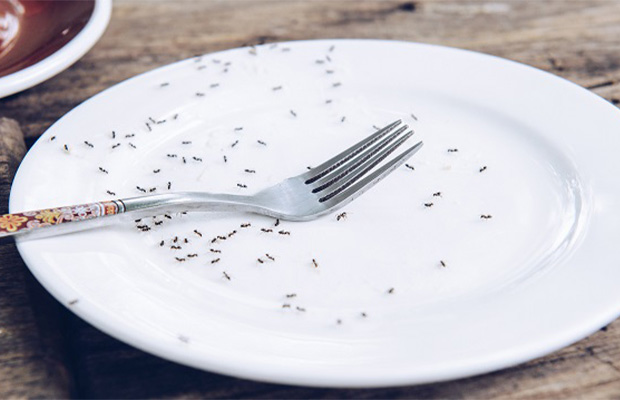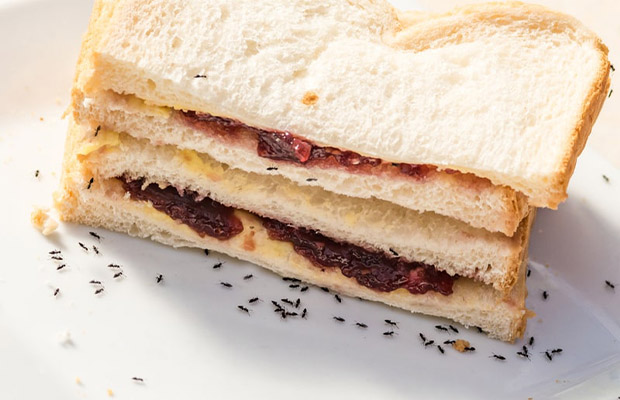Many people may ask: how to get rid of small ants in kitchen? Fortunately, there are a variety of approaches to get rid of house ants, from do-it-yourself techniques to expert services.
The worst house visitors are ants. Being proactive is essential because waiting too long will only allow them to expand their colonies, making it much more difficult to get rid of your ant problem.
In your kitchen, ant colonies can be eliminated using the methods listed here.
26 Ways to Get Rid of Ants in Your Kitchen
- Vinegar solution. Fill a spray bottle with an equal mixture of water and white distilled vinegar. Shake well, spray on ant-infested areas, and then remove with a sponge or damp cloth. It can also be sprayed in crevices and cracks where ants like to hide. Vinegar can kill ants when sprayed directly on them, and the smell of vinegar is sufficient to deter most insects.
- Lemon juice. Put some freshly squeezed lemon juice and equal parts water in a spray bottle. Shake well before using to clean surfaces, including your cutting boards.
- Cinnamon. The natural insect repellent properties of cinnamon sticks and powder can help keep ants at bay.
- Essential oils. Strong insect repellents include the essential oils of tea tree, lemon, eucalyptus, and peppermint. 20–30 drops of essential oils should be added to 2-3 cups of water in a spray bottle. Spray surfaces, then let them air dry.
- Baking soda. To make a thick paste, combine 2 tablespoons of baking soda with 1 to 2 tablespoons of water in a small bowl. Apply this paste to areas where ant trails are visible. Remove with a damp cloth or sponge after 10-15 minutes.
- Pepper powder. Ants are repelled by black and cayenne pepper. You can place pepper powder in cracks and around specific areas. Due to pepper’s potential to irritate skin, wear gloves and thoroughly wash your hands afterward.
- Cornstarch. Pour water over cornstarch-covered ant trails. The ants will be caught and killed in this way, and they can then be removed by wiping. If you want to remove the ants with a vacuum, you can also simply sprinkle cornstarch on them.
- Boric acid. Ants are effectively eliminated by boric acid. Because it is poisonous, exercise caution and keep children and pets out of the area. A cup of warm water, six to eight teaspoons of sugar, and one-twelfth of a teaspoon of boric acid should be combined to create the solution. After thoroughly stirring, use cotton balls soaked in the solution or pour the mixture directly over ant trails.
- Borax solution. 1 cup of warm water, 6 to 8 teaspoons of sugar, and 1 teaspoon of borax should be combined to make a syrupy solution in a disposable container. The use of this treatment can eliminate entire ant colonies. However, because it is toxic, care must be taken when using it.
- Bay leaf. Bay leaves have a potent aroma that can deter ants. To deter ants, place a dry bay leaf in containers containing dry foods like grains or flour.
- Diatomaceous earth. An all-natural powder called diatomaceous earth can dry out ants and deters them from entering cracks.
- Glass cleaner. Use a glass cleaner to frequently wipe surfaces. It can also be diluted with water and combined with liquid detergent to be used as a spray.
- Coffee grounds. To deter ants, sprinkle some coffee grounds on the troublesome areas.
- Chalk powder. Especially around cracks and kitchen counters, drawing lines of chalk powder can help keep ants away.
- Boiling water. Pouring boiling water into cracks will kill ants.
- Maintain a clean kitchen. As soon as you notice any spilled liquids or crumbs, wipe all surfaces, including the floor. Ants can be attracted by even the smallest amounts of food, especially sugary foods.
- Store food properly. Store food, including pet food, in airtight containers.
- Regularly dispose of your trash. Ants and other insects may be drawn to garbage. Every day, dispose of kitchen trash, and after use, properly dispose of soda cans.
- Keep fruits covered. Ants are drawn to fruits, particularly overripe ones. Avoid letting fruits become overripe by keeping them covered.
- Fix leaks. Ants can be attracted by leaking pipes, faucets, and sinks, especially in the scorching summer.
- Keep pet bowls clean. Make sure to clean up spilled or leftover pet food and wash pet bowls after each use.
- Prevent accumulation of water, dirt, or grease. In the kitchen, particularly in the corners and areas around faucets, dirt and grease can gather.
- Repair cracks. Ants and other insects can conceal themselves in wall and window cracks. You can either use cement to seal them or hire a professional to repair them.
- Observe proper plant care. Ants and other insects are frequently found on plants. Make sure to trim outdoor plants and trees to prevent them from touching your kitchen windows. To keep ants away from indoor plants, mist them with essential oil solutions.
- Use insect repellents or bait traps. These are widely offered on the market. To prevent any hazardous effects, be sure to adhere to the label’s instructions.
- Call a professional. If none of these DIY solutions work, seek the assistance of a pest control specialist to permanently eradicate your ant problem.
Read More: How Do You Get Rid Of Gnats In The Kitchen?
What Causes Tiny Ants in Kitchen?
In your home, ants frequently appear out of nowhere. Don’t freak out if you see them in the kitchen! They only invade your kitchen so they can have easy access to food and drinks. These annoying creatures will find their way onto your kitchen countertops if they are dirty or if there are easily accessible crumbs, sweets, or fruits.

Ants don’t require much food to enter your kitchen; sugar sprinkles, cake crumbs, and even a small juice spill are enough to draw them in. They easily acclimate where they find food because they are constantly on the lookout for it.
Fina Words: Keep Your Kitchen Ant-free
If you have access to home remedies, you won’t need to struggle to find practical solutions for getting rid of ants in the kitchen. Even though they generally cause little harm, ants can cause havoc in your kitchen and damage the structure of your house.
Keep track of the ants’ trails and movements if you see them in your kitchen to find out where their colony has been established. To kill or get rid of them, use the home remedies mentioned above.
Make sure the queen is also deceased to avoid a recurrence of the issue. After that, you can caulk up any openings and cracks in your walls, windows, and doors. After you’ve taken care of everything else, make sure to clean up your house to get rid of clutter so you can better control the areas where ants can hide.


